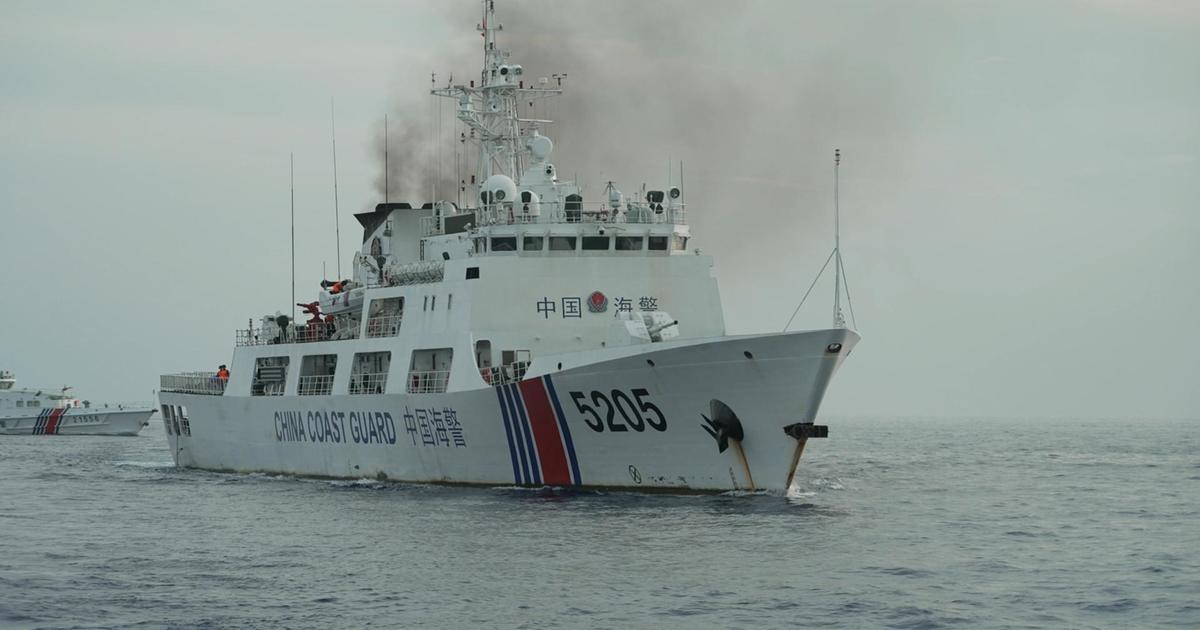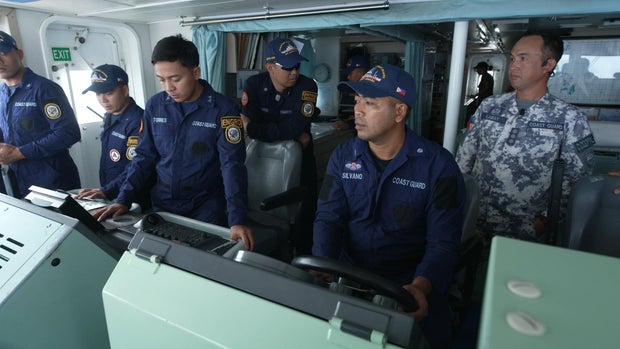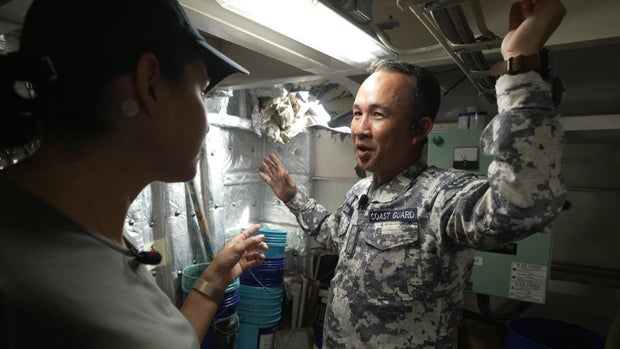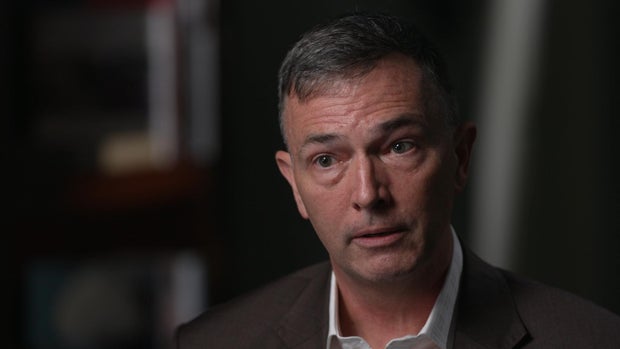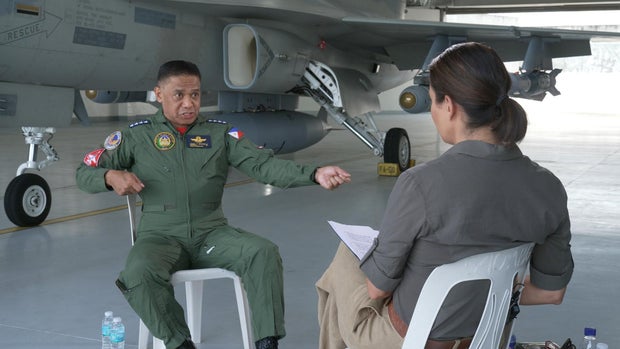If there’s going to be a military conflict between the United States and China, the thinking in Washington goes, it will most likely happen if China tries to invade Taiwan. But lately tensions have escalated precariously in another part of the South China Sea-the waters off the western coast of the Philippines where an international tribunal ruled the Philippines has exclusive economic rights. But China claims almost all of the South China Sea, one of the world’s most vital waterways through which more than $3 trillion in goods flow each year. To assert its claims, China has been using tactics just short of war — leading to violent confrontations. The United States has a mutual defense treaty with the Philippines, which could mean American intervention. It’s been called “the most dangerous conflict no one is talking about.” And last month we saw for ourselves just how dangerous it can be…
When we boarded the Philippine Coast Guard ship Cape Engaño last month, it was supposed to be for a routine mission resupplying ships and stations in the South China Sea.
But in the middle of our first night …
Sirens raged… crew members rushed between decks.
Cecilia Vega: It’s 4 in the morning. We’ve all been sound asleep. This alarm just went off on the ship. We were told to wake up and put our life jackets on because we’ve just been rammed by a Chinese boat.
There was confusion… fear. Our team was told to stay inside the cabin for safety.
It was unclear if we would take on water…. or if the Chinese would try to force their way on board…
60 Minutes
Philippine crew members prepared for that possibility and stood by the hatch holding clubs in case they had to fend off the Chinese.
This cellphone video taken by the Filipinos shows the moment just after impact– the Chinese coast guard ship- 269 feet long and nearly twice the size of the Cape Engaño– jammed into the Philippine’s starboard quarter- the rear right side of the ship.
When the Chinese pulled away…the Filipinos found a three-and-a-half-foot hole…an officer told us we were lucky the damage was above the water line…
Cecilia Vega: There are… you can’t see here in the dark– about four or five different Chinese boats surrounding us, at the moment. And the crew tells me they can see on the radar that more are coming right now
This happened about 60 nautical miles off the coast of the Philippines — and about 660 nautical miles from China… on the way to a place called Sabina Shoal…
Manila and Beijing have stationed Coast Guard vessels around the shoal in recent months, with the Philippines fearing China will take control…
In 2016, an international tribunal at the Hague ruled the Philippines has exclusive economic rights in a 200-mile zone that includes Sabina Shoal and the area where the Cape Engaño was rammed.
China does not recognize the ruling and says the South China Sea has been its territory since ancient times.
Cecilia Vega: We’re just getting our first light. And now, we have a much better sense of just how surrounded we are by Chinese vessels. You can see these two right here actually say, “China Coast Guard,” We’re at a complete standoff. We’ve been here for, going on, two hours now, not moving. It’s unclear whether we can even turn around and go back, if we wanted to. We’re just completely surrounded by Chinese ships.
Fourteen in all… including a militia of large fishing vessels used to help occupy territory and block ships like the one we were on…
The Filipinos tried to negotiate a way out, but ultimately were forced to abandon the first stop of their mission.
Cecilia Vega: He said we’re not going to Sabina
In their damaged boat… they had to take a long detour to their next supply drop, as Chinese ships followed closely.
By this time, the Chinese had already publicized their version of the incident — accusing the Filipinos of instigating the conflict and highlighting our team’s faces– accusing us of being part of a propaganda campaign
Chinese video: The Philippines has turned the South China Sea into its theater …deliberately ramming a Chinese Coast Guard ship, with Western journalists right there to capture the drama…
Cecilia Vega: they’re saying that this is your fault, this collision.
Captain Labay: If you do the ramming, the other ship would ha– would have the damage, not your ship.
Captain Daniel Labay, the top-ranking officer on the Cape Engaño, took us below deck to survey the damage..
60 Minutes
He told us it would not stop them from continuing on.
Captain Labay: This is our place. This is our exclusive economic zone. It’s– this is the Philippines.
Over the past two years, the Chinese have turned the South China Sea into a demolition derby– repeatedly ramming Philippine ships and blasting them with water cannons…
But what we saw on the Cape Engaño represented a significant escalation– bringing the battle lines closer than ever to the Philippine shore.
Within hours of the collision the Biden administration condemned China for what it called “dangerous and destabilizing conduct.”
Cecilia Vega: This has become an international incident what happened on your ship this morning.
Captain Labay: I’ve been assigned here for two years, and this is just what we deal with every day.
Cecilia Vega: Is it getting worse now?
Captain Labay: Yes, it’s– it’s getting worse.
Cecilia Vega: What’s behind this uptick in tension? What changed?
Gilbert Teodoro: I think, well, what changed is the determination of the Philippines to say, “No.”
Cecilia Vega: You’re standing up to China?
Gilbert Teodoro: Oh yes. Yes, and they don’t like it.
Gilberto Teodoro is the Philippine secretary of national defense.
Gilbert Teodoro: The proverbial schoolyard bully is the best example of what China is, you know. It– it just muscles you over.
60 Minutes
For example, he says: the aptly named Mischief Reef in the Philippines’ economic zone once looked like this…. it now looks like this. In the 1990s, the Chinese took it over and started turning the reef into a military base.
As the Cape Engaño passed near Mischief Reef…a Chinese Navy destroyer appeared…
E.J. Cruise: China Navy warship, 105….this is MRV 4411…
The Filipinos repeatedly asked for safe passage…
E.J. Cruise: Please keep clear of our passage and maintain safe distance. Over.
Each time there was no response… in a game of cat and mouse … the destroyer edged forward.
The Filipinos — forced to come to a stop and adjust course to avoid another collision.
Ray Powell: China has decided that at this point in their history, they are large enough so that they can buck the law.
In Manila, we met retired U.S. Air Force Colonel Ray Powell who runs the nonprofit Sealight…
… which tracks China’s actions in the South China Sea.
Cecilia Vega: How do they get away with this?
Ray Powell: There’s a law and there’s a judge, but there’s no– there’s no enforcer. There’s no prosecutor. There’s nobody to put ’em in jail
Cecilia Vega: There’s no sheriff out, unless, I suppose, the U.S. decides to intervene, which then, when then becomes the world policeman?
Ray Powell: You know, that’s the problem
The U.S. is bound by treaty to defend the Philippines if it comes under armed attack…
60 Minutes
Cecilia Vega: I wanna understand a scenario in which that red line could be crossed.
Ray Powell: You were just involved in a situation where you were hit by a larger ship. Imagine if that ship had sunk your ship and several people had died. What would the Philippines then feel compelled to do? They probably wouldn’t go instantly to war. But they might instantly get onto a war footing. They might go to the United States and say, “This looks a lot like an armed attack to us. We were hit by a ship and people died.”
Cecilia Vega: And in a scenario like that, would the United States be obligated to intervene?
Ray Powell: Look, every treaty– in– in the end depends on the political will of the parties. What I will say is if the United States fails or appears to fail to meet its treaty obligations, the entire U.S. treaty and alli– alliance and treaty structure is built on credibility.
Cecilia Vega: Your word means nothing?
Ray Powell: If it means nothing to the Philippines, what does it mean to Japan? What does it mean to Australia? What does it mean to NATO?
The U.S. has not had a permanent military presence in the Philippines since 1992. Though it does conduct regular joint exercises, and this year committed $500 million in military aid to Manila and another 128 million to upgrade bases.
We met General Romeo Brawner, the military chief of staff, at one of those bases, after he landed in his fighter jet following an aerial reconnaissance flight over the South China Sea.
Cecilia Vega: How much time do you spend focused on China?
General Romeo Brawner: Almost the whole day
Last year General Brawner visited the Philippines’ equivalent of the Alamo, a grounded World War II battleship called the Sierra Madre, manned by soldiers and used to hold down Manila’s claim to a disputed area in the South China Sea.
It was the scene of the most violent incident to date.
60 Minutes
In June, when the Philippine Navy tried to resupply those troops, the Chinese blocked the delivery… it was near hand to hand combat.
General Romeo Brawner: What was surprising was that they had bladed weapons with them. They had spears with them.
Cecilia Vega: You had never seen that before.
General Romeo Brawner: We have not seen that before. And they began– attacking our boats. They started puncturing our boats with their spears
A Filipino Navy SEAL lost his right thumb after the Chinese rammed his boat.
General Romeo Brawner: They stole our equipment. They destroyed our equipment. They hurt our personnel. And these are the doings of pirates. I warned our personnel – if this happens again, you have the right to defend yourselves.
Cecilia Vega: If the Chinese were to fire upon your men and your men fire back, sir, that sounds like the makings of the– the beginning of a war.
General Romeo Brawner: Yes. Yes, indeed, indeed
Defense Secretary Teodoro told us there are ongoing conversations between Washington and Manila about which scenarios would trigger U.S. involvement
Cecilia Vega: Do you worry that perhaps some unpredictable incident at sea could cause tensions to escalate? And then, you know, suddenly the Philippines, not Taiwan, becomes the flash-point in the South China Sea–
Gilbert Teodoro: Oh, yes. Oh, yes, definitely.
Cecilia Vega: If China were to take the Sierra Madre, would that merit America’s intervention?
Gilbert Teodoro: If China were to take the Sierra Madre, that is a clear act of war on a Philippine vessel.
Cecilia Vega: And you would expect American intervention–
Gilbert Teodoro: And we will react. And naturally, we would expect it.
Cecilia Vega: You’re talking about a rusty, old warship. How realistic is it to expect the United States to intervene over the fate of a warship like that?
Gilbert Teodoro: There are people in there, that is an outpost of Philippine sovereignty. So we’re not talking about a rusty, old vessel solely. We’re talking about a piece of Philippine territory in there.
President Biden has invited Philippine President Ferdinand Marcos Jr. to the White House twice in the past 16 months… and assured him of America’s support…
President Biden: “I wanna be very clear. The United States defense commitment to the Philippines is ironclad.”
Earlier this year Washington sent the Philippines a powerful weapon during joint exercises – a mid-range missile system capable of reaching mainland China.
Cecilia Vega: That clearly angered China in a big way
Gilbert Teodoro: Well, that’s none of their business. This is for Philippine defense.
Cecilia Vega: It’s none of China’s business that you have a missile that could reach their shores?
Gilbert Teodoro: What happens within our territory, it is for our defense. We follow international law. What’s the fuss?
Cecilia Vega: Do you plan to keep mid-range missiles capable of reaching mainland China at some of your bases?
Gilbert Teodoro: I can neither confirm nor deny if there is such a plan.
Cecilia Vega: You say, “What’s the fuss?” China says that you’ve brought the risk of war into the region by doing this.
Gilbert Teodoro: That’s what they always say. Everything the world does that they don’t like is the fault of the world.
Cecilia Vega: But how do you think this ends though? You don’t expect China to pack up and leave, do you?
Gilbert Teodoro: I really don’t know the end state. All I know is that we cannot let them get away with what they’re doing.
Produced by Andy Court and Jacqueline Williams. Associate producer, Annabelle Hanflig. Broadcast associates, Katie Jahns. Edited by Sean Kelly.
